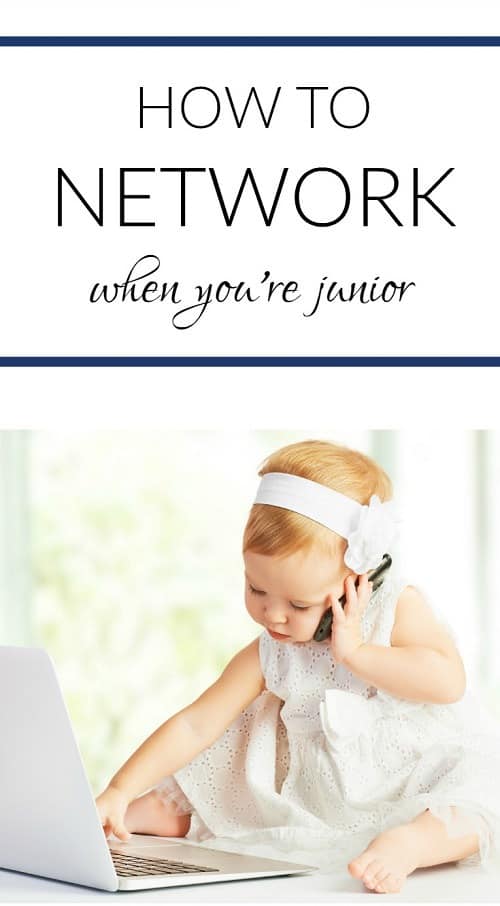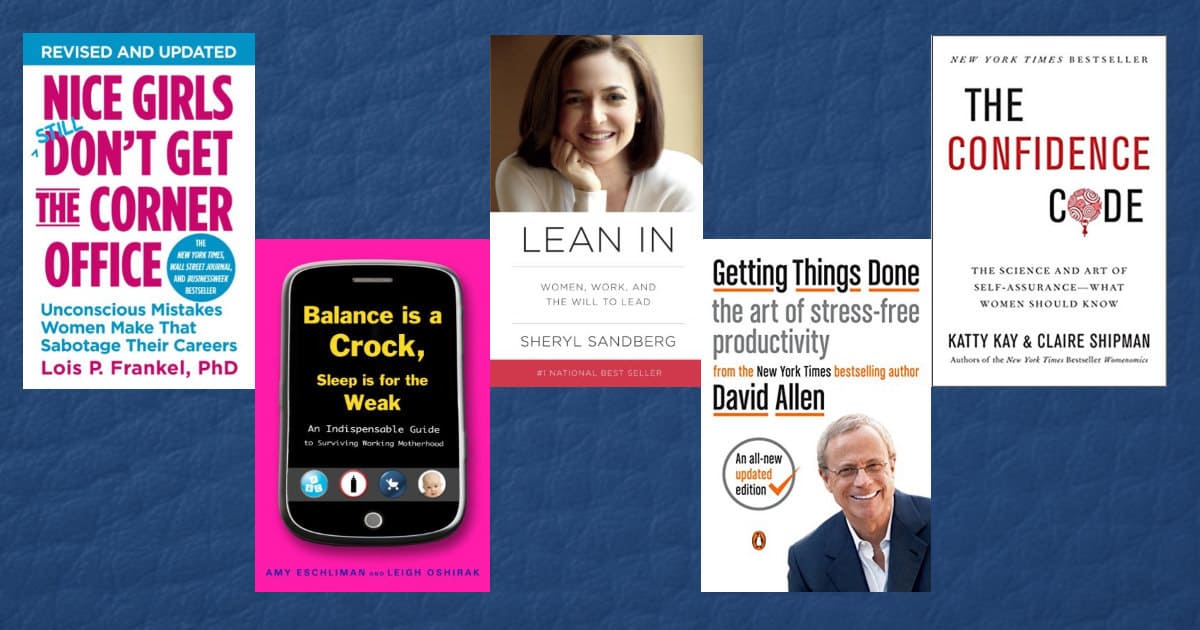This post may contain affiliate links and Corporette® may earn commissions for purchases made through links in this post. As an Amazon Associate, I earn from qualifying purchases.

Here’s a fun question, ladies: what are your best networking tips for younger women just starting out in their careers? What’s your best advice on how to network when you’re junior? We’ve rounded up some tips from readers in our last discussion, and I have some thoughts as well, but I’m curious to hear what you guys have to say about this.
For my part, I remember when I was just out of school I felt like it was so much harder to approach older people whose careers I admired — like it would have been so much easier if I’d had connections, influence, or experience to bring to the the table.
One of the best things that helped me overcome this fear of networking was doing a summer internship for magazine students where they heavily mentored us (every week we had a different major editor offering career advice to the group) and week after week people encouraged us to just reach out to people we admired and ask for coffee, lunch, breakfast.
The first trick was knowing what not to ask for — never a job, just advice — and even then it was often easier to ask them about their own path than for direct advice about your path.
The second trick was to know that their time was valuable, so either ask small (could I get 15 minutes of your time in your office to talk about career stuff / hear more about Magazine X / hear more about your path to Editor in Chief?) or make it “worth their time” by setting up a group lunch with several other interns or junior people.
The final trick they passed on was that once you were on someone’s radar, to stay on their radar — say hi at every event, send an occasional email with news that they would find interesting, or more — even just send a congratulatory email when they get a new job or new accolade.
(We’ve also talked in the past about the different tactics you may want to use when networking with older men vs. networking with older women.)
Now that I’m older I would also advise my younger self to not discount networking among fellow junior colleagues — make friends, get to know people, stay in touch. Hopefully this is totally perfunctory advice and you’re making friends with colleagues regardless of whether they can help you down the line — but it’s one I haven’t heard said a lot in networking advice, at least directly.
Readers’ Tips on How to Network If You’re Junior
The last time we discussed this, the readers (as always!) had a ton of great advice on how to network when you’re junior:![]()
- When you’re contacting someone for the first time, don’t ask for a job outright. Introduce yourself and explain why you’re reaching out, e.g., you want to learn more about her field because you’re considering a career change, or you’d like some advice on a specific situation, or you’ve just moved the area and are looking to connect with people in your field.
- Proofread your email — typos can ruin your first impression. If you can, personalize it a bit so that the person can tell you’re writing to them and not just copying and pasting the same message to a whole list of people.
- When you ask for advice, listen more than you talk.
- Use the back of a new contact’s business card to jot down some information you want to remember, e.g., someone’s alma mater, hometown, favorite hobby, or a big work project she spoke to you about. You can use these details the next time you meet (as long as you can find natural ways to introduce one or more of them).
- When you’ve been corresponding with someone, don’t drop the ball. If someone offers to meet with you or speak on the phone, make sure you follow up so that you won’t burn that bridge. This especially applies to new contacts that have been shared with you by someone in your existing network — if you want her to connect you with more people, avoid looking (and being) flaky.
- Don’t make assumptions about people’s lives if you’ve just met them, like assuming that a woman is married or has kids just because they’re older than you.
- One way to keep in touch with contacts is to occasionally email a relevant, useful article about their field or about another topic you’ve discussed. You can add a comment to say that you’d like to hear her thoughts on it.
- One reader said that casual, general invitations have worked for her when she wants to keep in touch with people she’s met. She’ll reach out to a contact and say, “Hey, I haven’t talked with you in a while and I’m interested in finding out what you’re up to lately. Do you have time for lunch?” She says that while sometimes people seem surprised, no one’s turned her down yet.
- If you’re looking to find someone who might develop into a mentor, it’ll work out best if you like her as a person and not just as a tool to get advice or advance your career — and that she likes you too.
- A great direct quote from a commenter: “My primary piece of advice is not to be scared of us. We may have a lot of years, and some success, under our belts, but we’re still women who like to go out to a bar, laugh, tell stories, make fun of ourselves and the world. The more you connect to us in a genuine way, the better.”
Ladies, how about you — what is your best advice on how to network when you’re junior? What did you do when you were junior; if you’re farther along now what have you seen work and not work? Has your own networking technique changed over the years?
Psst: you may want to check out our tips for how to find professional organizations to join, as well as sign up for more details on our forthcoming Career Planner!
Pictured: Shutterstock / Evgeny Atamanenko.



Harriet
When I started out, I just listened and nodded in meetings. I soon learned, however, that you needed to assuage the egos of the senior partners, so I also raised issues they had forgotten, and then just said that it was their idea for me to just follow up on those issues. Over time, I started to speak up more, and now that I am a 6th year, I think I have a fair shot at becoming a partner. My boyfriend is thinking I should not get my hopes up, and he is right, but I do think I would make a great partner at the firm.
AKB
Sort of related – I was wondering if it would be out of line to connect and message a hiring manager on LinkedIn for a job. I really want to break through the HR filters because I think I would be a perfect fit for this job, but do not want to be too pushy or weird.
tazdevil
It’s not pushy – if they do not want to speak with you, they know how to use the delete button!
Shopaholic
Please don’t drop the ball. I’ve had a bunch of students or more junior associates email me and then never respond to my reply. I find it really inconsiderate.
anon
I’ve met quite a few people at networking events recently and would like to stay in touch. Despite the fact that we talked on average between 10 and 20 minutes, I can’t really think of anything to email them about (an article or otherwise) that wouldn’t just look like I found something mildly maybe pertinent to our discussion and sent it as a ploy to stay on their radar. Is this okay? It doesn’t feel genuine to me, but I also don’t want to meet people once and never follow up when we did have a good chat.
Senior Attorney
You know what? It doesn’t really need to feel genuine.
I had an acquaintance who would regularly get in touch — maybe a few times a year for no reason, definitely a note every single time my name was in the legal newspaper, and so on. It was pretty obvious that she was doing it to be networky. But guess what? It worked. When I needed to refer somebody to a lawyer in her area of practice, she was the one I thought of first. And she ended up on all kinds of professional association boards and is now a judge. People don’t much like her but everybody knows her and she’s been really successful.
anon
Is that the reason they don’t like her much? Or is it other things? I guess my question is does being super networky in this manner necessarily come at the expense of being liked?
Senior Attorney
That’s a good question. And I don’t mean to say that nobody likes her. She has a big fan base of people who seems to like her fine, as well as a good number of people who don’t like her. The lesson I have taken from that is that maybe being liked isn’t the be-all and end-all of one’s professional life.
I mean, would you rather be really successful and connected or have everybody (where “everybody” = “less than the number of people with whom you would be in touch if you networked hard”) like you?
anon
That’s a fair point. I’m just wondering if it’s really as dichotomous as it sounds here.
Senior Attorney
Look, if you’re generally a person with decent social skills, I think you will be fine. Nobody is going to hold it against you. Just try not to suck all the air out of the room when you’re actually with the people! ;)
anonymous
Thanks, SA. This is helpful :)
Wildkitten
Set up a google news alert for the person – you might get some ideas.
Senior Attorney
I’m convinced that’s what my friend does — she must have google news alerts for everybody in her contacts list.
Wildkitten
I love it. It’s so fun.
MNF
Additional networking advice — If you’re nervous or “bad” at networking, sign up for a bunch of explicitly networking events. Check out events hosted by your local chamber of commerce, professional group etc., that contain the word “networking” (e.g., speed networking, networking breakfast, cocktails and conversation). I think that these are great starter events because everyone is explicitly there to network together. (Compare to a not-for-profit fundraiser, there’s obviously networking to be done, but that’s not the primary purpose of the event).
Little Red
Completely OT: Adorable photo up top.
Goosebumpy
I was coming solely to comment on that, too. Loved it!
gingersnap
So when it comes to following up/not dropping the ball….is it ever okay to send followup emails? e.g. someone tells you they’ll check their calendar for a good day for lunch and never sends another email? I’m almost obsessive about responding to emails, but I have a hard time distinguishing between when someone politely fades out and when someone just has a lot going on and just happened to forget. I err on the side of not being obnoxious….but I’m starting to feel like this is hurting me.
CM
Follow up one time — a week later is usually good — then let it go.
Mariah
People adore talking about themselves. I only had one or two people out of probably 30 people I cold-emailed over the course of law school decline or never respond to my request to buy them a coffee and hear about what they do. I’d email them saying “Hi, Person. I’m a 1L and I might be interested in going into Field. While looking around (organization/firm website) I noticed that you also (graduated from my law school, graduated from my undergrad, worked in my hometown for awhile, etc). I’d love to buy you coffee some time to hear more about what you do. What does your availability look like next week or the week after?” Hugely successful.
Also: I knew from about fall of 1L year that I didn’t want to go into firm work. However, throughout 1L year, I kept going to the numerous firm networking events because it was a way to practice networking without the pressure of “These people will remember me at OCI and I will forever be blacklisted!” I didn’t care because I wasn’t doing OCI. So I could mess up and not be perfectly on-my-game. When it came time to go to events in the area I DID want to work in, I was much smoother and more confident because I’d gotten out of the way all of the initial intimidation of networking with low-pressure events.
As I figured out where I wanted to end up, I could be a lot more specific- “Hi, X- I met you briefly at Y, and you mentioned you’re establishing Z Project at Office. I’d love to buy you a coffee and hear more about it sometime. I’m currently interning with Related Issue Area and am always interested in expanding my knowledge and familiarity with all the possible careers Issue Area entails. I’m generally availble at ABC times during the week, but can be flexible, I know you’re very busy.” This worked for quite a few different “levels” of people, from first-year attorneys to a super important member of our state’s attorney general’s office.
Now that I’m no longer a law student with zero experience, networking is a lot easier. I have some experience behind me (not much, but enough that I can almost always find something to connect about with anyone at a networking event), and confidence that I actually know what I’m talking about.
I kept in mind there’s really nothing to lose from reaching out to someone who you admire, and if anything, they’ll be flattered, as well as that the chances of someone remembering that one awkward moment where you did super embarrassing thing is pretty low in the grand scheme of things.
Anonymous
When I was junior and networking, there were always those guys. By “those guys”, I refer to the creepy men who think that a junior women trying to network is open to romantic and/or sexual relationships with them.
To avoid being targeted by these predators, I suggest:
1. avoiding prolonged eye contact
2. avoid long conversations/move on to another conversation frequently
3. leaving adequate physical space between you and them when they talk. If it’s crowded, see #2. If they are trying to lean in because they can’t hear you, speak louder.
If one of these guys “accidentally” gets the wrong impression, DO NOT BLAME YOURSELF. DO NOT FEEL SORRY FOR REJECTING HIS ADVANCES. Remember that this is inappropriate behavior on his part and does not reflect on you.
another anon
Question (from the law student peanut gallery): I am much, much more comfortable cold emailing women than men. Of course, if there is an introduction, or if I meet a man at an event, I am fine following up. Otherwise, I pretty much just look at the women on staff at a firm or organization and reach out to them. I know several of my female friends feel similarly (I don’t know if my guy friends feel more comfortable emailing men, or if they don’t have a preference either way).
Did any of you more senior women feel the same way? Do you still feel more comfortable networking with other women? At some point, I will have to get over this! I don’t want my networking pool to be shrunk in half.
Mariah
I was thinking about this after reading rhe comment above and realized that most of my initial email contacts and meetings were women. Since then, it’s become a lot more equal in terms of who I contact out of the blue. My main mentor is a man, but I also have a female mentor. I don’t think it’s problematic if you can find successful women in the area you want to go into and connect with them at first, though. Networking can suck and if you’re not 100% comfortable it totally sucks.